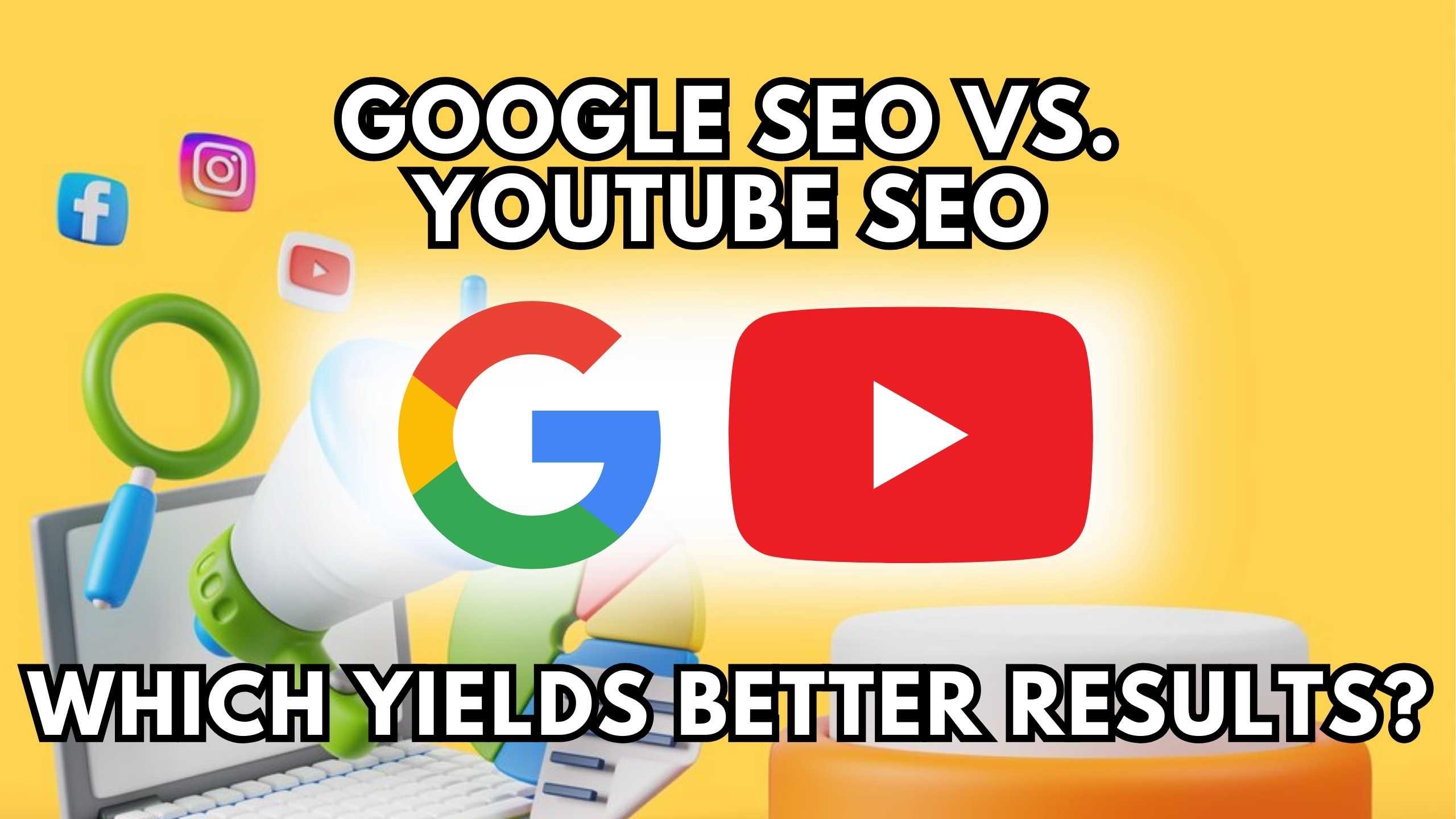Google SEO vs. YouTube SEO: Which Yields Better Results?
- Conversational Marketing Software SEO Software Affiliate Marketing Software Marketing Tools


Google SEO vs. YouTube SEO: Which Yields Better Results?
Search engine optimization (SEO) is critical for driving traffic to websites and YouTube channels. But should you focus your optimization efforts on Google SEO or YouTube SEO? Understanding the pros and cons of each will help you allocate time and resources to the strategies that will yield the best results.
Keyword Research Differences
Thorough keyword research lays the foundation for an effective SEO strategy. But keyword research differs across Google and YouTube.
For Google SEO, analyze search intent and volume for text-based queries across Google Search and tools like Google Trends. Identify relevant, high-traffic keywords that align with your website content and offerings.
For YouTube, examine what search terms people use to find videos around topics that your channel covers. Identify video-focused long-tail keywords with decent search volume. Also research broader topics that bring in a lot of views.
Optimization Factors
Google and YouTube algorithms analyze on-page and off-page factors differently when determining rankings.
For Google SEO, optimize target keywords usage, craft in-depth text content, and build high-quality backlinks from reputable websites. Site speed, security and UX impact rankings too.
For YouTube SEO, extensively optimize video titles, tags and descriptions for target phrases. Engaging thumbnails and quality content also contribute to higher rankings and viewer retention.
Ranking Difficulties
Both Google and YouTube have vast, competitive pools of content. But YouTube presents some exceptional SEO challenges.
Over 100 hours of video get uploaded to YouTube every minute. Breaking through the noise is extremely difficult without an existing audience.
However, YouTube’s powerful suggestion algorithm can work as an SEO multiplier once viewers start engaging past the few second mark. This triggers a viral effect propagating content widely.
Tracking SEO Success
Robust analytics are vital to continually gauge your SEO strategies’ effectiveness.
For Google SEO, connect Google Analytics to evaluate website sessions and conversions generated by organic traffic. Track clicks, rankings and clicks for target keywords.
For YouTube, dig into Creator Studio metrics like impressions, views, traffic sources, watch time and audience retention. Monitor how viewers discover your content.
Maximizing Reach & Conversions
Ultimately SEO’s purpose is driving incremental reach and conversions. The platform with the most potential to achieve your specific business goals should take priority.
YouTube delivers unmatched audience scale and engagement. Over 2 billion logged-in monthly users cover every age demographic. If brand-building and awareness are top goals, prioritizing YouTube SEO pays dividends.
Google search still sees significantly more explicit commercial intent queries. If you offer ecommerce or lead generation Google SEO drives more qualified traffic to convert.
Allocate SEO resources based on reach vs conversion potential to see the best ROI. Or leverage both channels for an omni-channel approach.
Recommended Saas Products:
Certainly! Expanding the descriptions:
- HubSpot: HubSpot is an all-in-one inbound marketing and sales platform designed to streamline and integrate marketing, sales, and customer service processes. It offers tools for lead generation, customer relationship management (CRM), email marketing, analytics, and more, providing businesses with a comprehensive solution to attract, engage, and delight customers.
- Asana: Asana is a leading work management tool for teams, offering a collaborative platform to organize tasks, projects, and workflows. With features like project timelines, task assignments, and communication tools, Asana enhances team productivity and ensures efficient project execution.
- Slack: Slack stands out as a top business messaging app, providing teams with a centralized communication hub. Offering channels for real-time collaboration, file sharing, and integration with various tools, Slack facilitates seamless communication, fostering teamwork and efficiency.
- Zapier: Zapier is a user-friendly platform that enables easy automation across web apps. By creating automated workflows (Zaps) connecting different applications, Zapier helps businesses automate repetitive tasks, enhance productivity, and streamline data flow between various tools.
- Everhour: Everhour is a versatile time and project tracking software that simplifies time management and project tracking for teams. With features like time tracking, budgeting, and reporting, Everhour helps businesses monitor project progress, allocate resources efficiently, and maintain a clear overview of time-related metrics.
Conclusion
Google SEO and YouTube SEO share foundational principles but optimize and track differently. Evaluate your business objectives, resources and audience to determine which channel offers the highest potential return. Or develop a strategic presence across both Google and YouTube to maximize impact.
Elevate Your Digital Marketing Game with Subscribed.fyi
Ready to optimize your digital marketing efforts? Subscribed.fyi is here to streamline your SaaS stack management. Sign up for free to access exclusive member-only deals on 100+ SaaS tools, saving over $100,000 per year! Unlock secret deals and manage all your subscriptions effortlessly with Subscribed.fyi.
Unlock Your Digital Marketing Potential Now!
Relevant Links:





